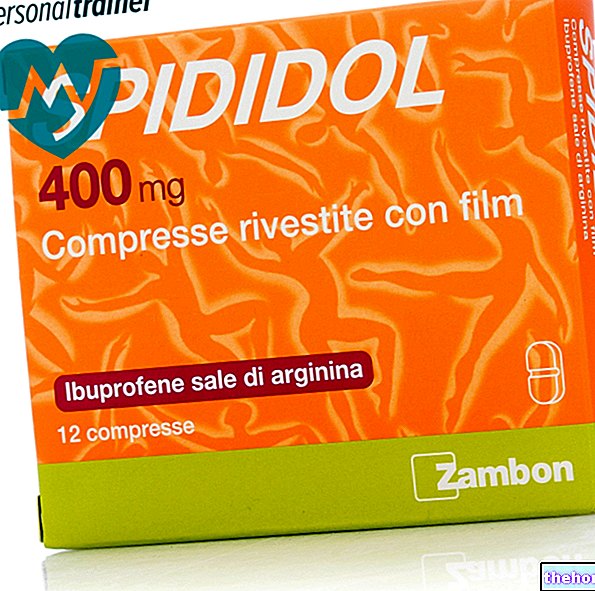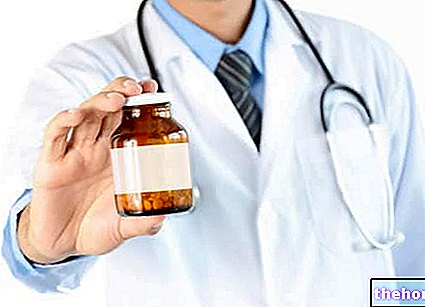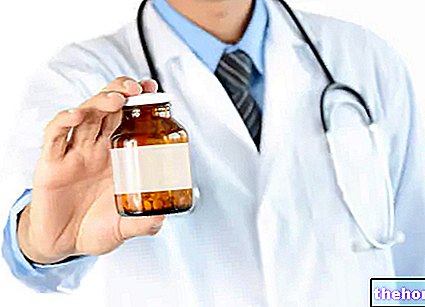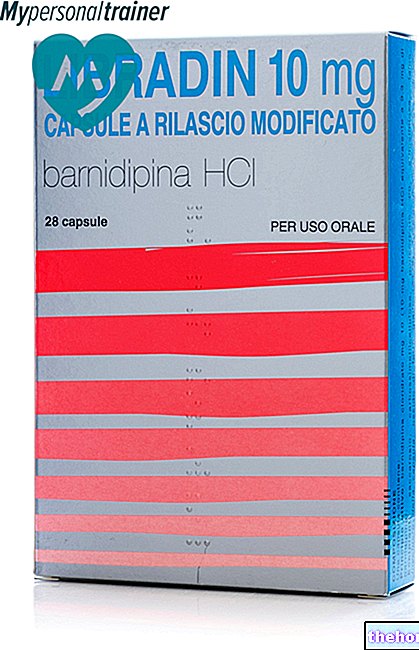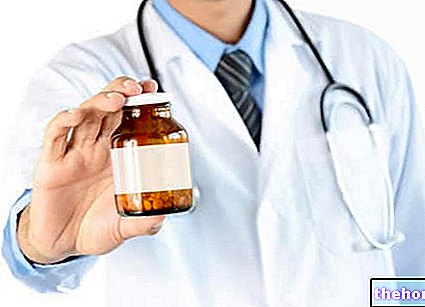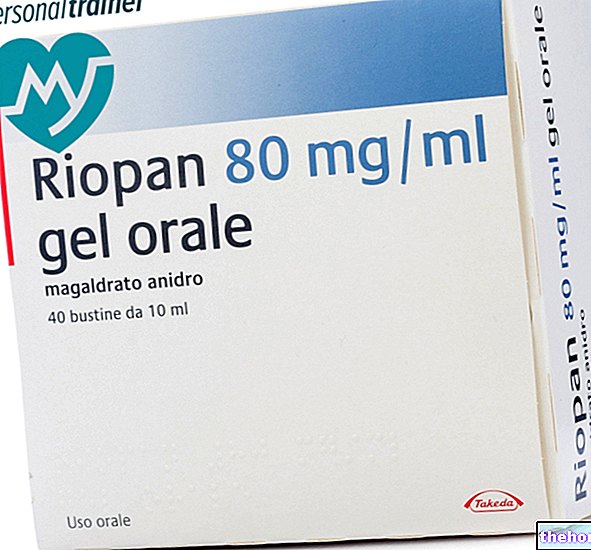Active ingredients: Ibuprofen (Ibuprofen arginine salt)
SPIDIDOL 400 mg film-coated tablets
SPIDIDOL 400 mg granules for oral solution apricot aroma
Spididol package inserts are available for pack sizes: - SPIDIDOL 400 mg film-coated tablets, SPIDIDOL 400 mg granules for oral solution apricot aroma
- SPIDIDOL 400 mg granules for oral solution mint-anise aroma
Why is Spididol used? What is it for?
This medicine contains the active substance ibuprofen, which belongs to a group of medicines known as non-steroidal anti-inflammatory drugs (NSAIDs) which work by relieving pain (analgesic action) and reducing the symptoms of inflammation (anti-inflammatory action).
SPIDIDOL is indicated for the treatment of pain or inflammatory states in the following cases:
- Pain treatment: headache, toothache, menstrual pain, neuralgia, osteoarticular (bone) and muscle pain.
- Treatment of fever and flu, in addition to other medicines.
Contact your doctor if you do not notice any improvement or if you notice worsening of your symptoms.
Contraindications When Spididol should not be used
Do not take SPIDIDOL
- if you are allergic to ibuprofen, other similar medicines or any of the other ingredients of this medicine
- if you have suffered in the past from stomach and bowel disorders associated with bleeding (gastrointestinal bleeding or perforation related to previous treatments or a history of recurrent peptic ulcer / haemorrhage, with two or more distinct episodes of proven ulceration or bleeding);
- if you suffer from stomach and intestinal disorders associated with lesions and bleeding (active and recurrent peptic ulcer);
- if you suffer from bleeding in the stomach or intestines (ongoing gastrointestinal bleeding);
- if you have ulcerative colitis or Crohn's disease;
- if you have severe liver or kidney problems (severe liver and kidney failure);
- if you have severe heart problems (severe heart failure);
- if in the past, after taking anti-inflammatory medicines (NSAIDs), you have experienced swelling of the face due to fluid accumulation, especially around the mouth and eyes (angioedema), breathing problems (asthma), skin irritation (hives), inflammation of the nasal mucous membranes (rhinitis) or nasal polyposis;
- if you are in the third trimester of pregnancy (See section "Pregnancy, breast-feeding and fertility");
- if you have phenylketonuria, a condition in which the levels of certain substances in the urine and blood are altered. This warning refers only to the granules for oral solution as it contains aspartame.
Precautions for use What you need to know before taking Spididol
Talk to your doctor or pharmacist before taking SPIDIDOL
Take this medicine with caution if:
- you are already taking other anti-inflammatory medicines (including selective COX-2 inhibitors, see section "Other medicines and SPIDIDOL").
- you are taking other medicines that may increase the risk of ulceration or bleeding, such as oral corticosteroids, anticoagulants such as warfarin, selective serotonin reuptake inhibitors or antiplatelet agents such as aspirin (See section "Other medicines and SPIDIDOL");
- you have suffered from high blood pressure (hypertension) because, in association with NSAID therapy, you may have problems with the elimination of fluids (water retention) and experience swelling due to fluid accumulation (edema).
- suffer from heart problems (mild to moderate congestive heart failure);
- have suffered from breathing problems (bronchospasm) especially as a result of the use of medicines. In these cases, especially for prolonged treatments, your doctor may suggest that you undergo periodic tests;
- suffer from a decrease in the functioning of the heart, liver or kidneys; in these cases, especially for prolonged treatments, analyzes may be required to be performed periodically. A "hypersensitivity to SPIDIDOL can cause liver problems (hepatotoxic reactions).
- if you suffer from lupus erythematosus, a chronic autoimmune disease which can affect various organs and tissues and which causes facial injuries and pain, or suffer from other skin diseases (collagen diseases) you should consult your doctor before taking SPIDIDOL;
Risks of stroke and heart attack: Medicines such as SPIDIDOL may be associated with a small increase in the risk of heart attack ("myocardial infarction") or stroke. If you have heart problems, have had a stroke or if you think you are at risk for these conditions (for example if you have high blood pressure, diabetes or high cholesterol level or if you smoke) consult your doctor or pharmacist.
Gastrointestinal Risks: At any time, with or without warning symptoms or a previous history of serious gastrointestinal disease, bleeding of the stomach and intestines (gastrointestinal haemorrhage), formation of serious lesions (ulceration and perforation), which can be fatal, may occur. If you have suffered from an ulcer in the past, the risk of gastrointestinal bleeding, ulceration or perforation is higher with increased doses of NSAIDs. Your doctor will advise you to take specific medications to protect the stomach such as misoprostol or proton pump inhibitors, especially if you take others medicines (for example, aspirin or medicines that increase the risk of gastrointestinal problems). If you have or have suffered from stomach or bowel problems (gastrointestinal toxicity), especially when starting treatment with SPIDIDOL, tell your doctor any gastrointestinal symptom should occur (especially bleeding). At higher doses of 1000 mg per day, prolongation of bleeding time may occur.
If you experience gastrointestinal bleeding or ulceration, stop taking SPIDIDOL and contact your doctor or the nearest hospital.
Skin problems
Stop taking this medicine if you notice skin irritation (rash) or formation of mucosal lesions or any other signs of hypersensitivity. Serious skin reactions such as exfoliative dermatitis, Stevens-Johnson syndrome and toxic epidermal necrolysis, although very rarely, can occur especially within the first month of treatment and some can be very serious, even fatal.
If you suffer from lupus erythematosus, a chronic autoimmune disease that can affect various organs and tissues and cause facial injuries and pain, or suffer from other skin diseases (collagen diseases), the risk of developing skin disorders increases.
Eyesight problems
If you experience visual disturbances, stop taking this medicine and contact your ophthalmologist.
Elderly patients: If you are an elderly person the risk of side effects is greater, especially bleeding and perforation in the stomach and intestines (gastrointestinal events) which can be fatal. The risk of gastrointestinal bleeding, ulceration or perforation is higher with increased doses of NSAIDs. Therefore, start treatment with the lowest available dose and take SPIDIDOL for the shortest possible time to control symptoms. Your doctor may tell you about medicines that have a protective effect on the stomach (misoprostol or proton pump inhibitors), especially if you are taking other medicines (for example, aspirin or medicines that increase the risk of gastrointestinal problems). stomach or intestinal problems (gastrointestinal toxicity), particularly at the start of treatment with SPIDIDOL, tell your doctor any gastrointestinal symptoms you experience (especially bleeding). At doses higher than 1000 mg per day, prolongation may occur of the bleeding time
If you experience gastrointestinal bleeding or ulceration, stop taking SPIDIDOL and contact your doctor or the nearest hospital.
Children and adolescents
This medicine should be administered with caution to dehydrated adolescents because there is an increased risk of kidney problems (see section 3 "Use in adolescents aged 12 to 18 years").
Pay special attention in the above cases bearing in mind that any risk is more likely when using this medicine in high doses and in prolonged therapies.
Interactions Which drugs or foods can modify the effect of Spididol
Tell your doctor or pharmacist if you are taking, have recently taken or might take any other medicines.
Taking SPIDIDOL, like other medicines similar to it (non-steroidal anti-inflammatory drugs, analgesics, antipyretics), can cause allergic (hypersensitivity) reactions, including severe ones (see the section "Possible side effects"). Do not use SPIDIDOL if are taking other anti-inflammatory medicines (for example analgesics, antipyretics and other NSAIDs, such as acetylsalicylic acid / aspirin), as the risk of side effects may increase. If you take acetylsalicylic acid (Aspirin) products for heart problems, do not take SPIDIDOL as the cardioprotective effect can be reduced.
Use this medicine with caution and talk to your doctor if you are taking the following medicines:
- medicines used to reduce inflammation and to treat allergies (oral corticosteroids); SPIDIDOL may increase the risk of stomach or intestinal ulcers or bleeding;
- medicines used to treat certain blood clotting problems (antiplatelet and anticoagulants, for example acetylsalicylic acid / warfarin, ticlopidine); SPIDIDOL may increase (for example with warfarin) the effect of these medicines, your doctor can then ask you to carry out appropriate tests to assess whether to change your therapy. SPIDIDOL may also increase the risk of stomach or intestinal bleeding;
- medicines used to treat high blood pressure (diuretics, ACE inhibitors eg captopril, thiazide diuretics, beta-blockers and angiotensin II antagonists). SPIDIDOL may alter the effect of the medicines you are taking. In addition, if you have kidney problems, especially if you are elderly or dehydrated, SPIDIDOL may aggravate your condition if you are taking ACE inhibitors or angiotensin II antagonists; in these cases it is necessary that you take the right amount of fluids, in addition your doctor may periodically check your proper functioning of your kidneys after starting treatment;
- medicines used to treat depression and anxiety disorders (serotonin reuptake inhibitors) SPIDIDOL may increase the risk of stomach or bowel bleeding;
- medicines used for mental disorders based on lithium and phenytoin;
- medicines used to treat heart problems such as digoxin
Warnings It is important to know that:
Pregnancy, breastfeeding and fertility
If you are pregnant or breast-feeding, think you may be pregnant or are planning to have a baby, ask your doctor or pharmacist for advice before taking this medicine.
Pregnancy
Before starting the treatment, make sure you are not pregnant, stop it if you are sure you are.
Do not use SPIDIDOL if you are in the third trimester of pregnancy. If you are in the first or second trimester of pregnancy, do not use SPIDIDOL unless strictly necessary. If you are expecting to conceive, or during the first and second trimester of pregnancy, use the lowest possible dose and duration of treatment.
Pregnancy
Avoid taking SPIDIDOL while breastfeeding.
Fertility
Do not take SPIDIDOL if you have fertility problems.
Driving and using machines
This medicine may cause drowsiness, dizziness and depression which may impair the ability to drive and use machines. If these effects occur, avoid driving and using machines.
SPIDIDOL 400 mg film-coated tablets contain sucrose and sodium
- This medicinal product contains sucrose. If you have been told by your doctor that you have an intolerance to some sugars, contact your doctor before taking this medicinal product.
- This medicine contains 82.62 mg of sodium. To be taken into consideration in people with reduced kidney function or who follow a low sodium diet.
SPIDIDOL 400 mg granules for oral solution contains aspartame, sucrose and sodium
- This medicine contains a source of phenylalanine (aspartame). It can be harmful to you if you have phenylketonuria.
- This medicinal product contains sucrose. If you have been told by your doctor that you have an intolerance to some sugars, contact your doctor before taking this medicinal product.
- This medicinal product contains 56.96 mg of sodium. To be taken into consideration in people with reduced kidney function or who follow a low sodium diet
Dose, Method and Time of Administration How to use Spididol: Posology
Always take this medicine exactly as described in this leaflet or as directed by your doctor or pharmacist. If in doubt, consult your doctor or pharmacist.
Use in adults and adolescents (from 12 years)
The recommended dose is 1 tablet or 1 sachet, 2-3 times a day.
Do not exceed the maximum recommended dose of 1200 mg per day (3 tablets / sachets). Swallow the tablets with some water.
Granules: dissolve the contents of one sachet in a glass of water (50-100 ml) and take it immediately after dissolving it.
Use in adolescents aged 12 to 18 years
Consult your doctor if treatment lasting more than 3 days is required or if symptoms worsen.
Use in older people
If you are an elderly person, follow the minimum dosages indicated above. However, always contact your doctor as a dose reduction may be necessary.
Do not exceed the recommended dose or duration of treatment.
The risk of side effects can be reduced by using the lowest effective dose for the shortest possible time
Overdose What to do if you have taken too much Spididol
Most cases of overdose occur without symptoms. However, symptoms of overdose can occur within 4 hours of taking an overdose and can be:
- nausea, vomiting, abdominal pain, drowsiness, even severe (lethargy), headache, perception of ringing in the ear (tinnitus) and ataxia (loss of muscle coordination).
The most severe symptoms can be:
- seizures, severe muscle disorders (rhabdomyolysis), increased acidity of the blood (metabolic acidosis), lowered body temperature (hypothermia), decreased blood pressure (hypotension), kidney problems (acute kidney failure), coma, breathing difficulties, even severe (apnea, respiratory failure).
Treatment of overdose is symptomatic, in addition, the doctor will need to check the correct functioning of the kidneys and liver.
If you have swallowed / taken too much of this medicine, consult your doctor immediately or go to the nearest hospital.
If you forget to take SPIDIDOL
Do not take a double dose to make up for a forgotten dose. If you have any further questions, ask your doctor or pharmacist
Side Effects What are the side effects of Spididol
Like all medicines, this medicine can cause side effects, although not everybody gets them.
The following side effects may occur:
Very common (may affect more than 1 in 10 people)
- difficulty in digestion (dyspepsia);
- diarrhea.
Common (may affect up to 1 in 10 people)
- abdominal pain or discomfort, burning sensation in the stomach (heartburn), nausea, flatulence;
- headache (headache), dizziness;
- skin irritation (rash).
Uncommon (may affect up to 1 in 100 people)
- formation of lesions in the stomach or intestines (peptic ulcers or haemorrhages) sometimes fatal particularly in the elderly;
- He retched;
- presence of blood in the stool (melena);
- stomach inflammation (gastritis);
- inflammation of the mouth (stomatitis);
- confusion;
- drowsiness;
- itching, skin irritation (hives, exentema), severe skin problem associated with bleeding (purpura);
- swelling of the face, especially around the mouth and eyes (angioedema);
- allergic reactions;
- breathing difficulties (asthma, worsening of asthma, bronchospasm, dyspnoea).
Rare (may affect up to 1 in 1,000 people)
- formation of lesions in the stomach or intestines (gastrointestinal perforation);
- constipation;
- presence of blood in the vomit (haematemesis);
- inflammation of the mouth associated with lesions (ulcerative stomatitis);
- worse than some chronic inflammatory bowel diseases (colitis and Crohn's disease);
- impaired hearing, perception of ringing in the ear (tinnitus);
- visual disturbances (blurred vision and amblyopia);
- altered levels of platelets, white blood cells and red blood cells (thrombocytopenia, agranulocytosis, aplastic anemia, haemolytic anemia, granulocytopenia);
- presence of blood in the urine (hematuria);
- passing urine with difficulty (dysuria);
- liver problems (jaundice);
- increased levels of enzymes produced by the liver (elevated transaminases);
- disturbances in distinguishing colors;
- severe allergic reaction (anaphylaxis).
Very rare (may affect up to 1 in 10,000 people)
- weakening of sensory and orientation functions (sensory clouding), a combination of symptoms caused by irritation of the meninges (meningism);
- severe skin disorders (exfoliative dermatitis, reactions including Stevens-Johnson syndrome and erythema multiforme, toxic epidermal necrolysis, allergic vasculitis);
- kidney problems (interstitial nephritis, papillary necrosis, renal failure, including the acute form).
Not known (frequency of which cannot be estimated from the available data)
- decreased appetite and body weight (anorexia);
- swelling of part of the body due to fluid accumulation (edema);
- fever;
- heart problems (heart failure);
- increased blood pressure (hypertension);
- problems with blood circulation (thrombosis);
- depression and mental problems (psychotic reaction);
- worsening of skin irritation;
- stiffness of the muscles;
- increased levels of uric acid in the blood (uricaemia);
- poor sodium and fluid elimination resulting in swelling (edema);
- menstrual cycle disorders.
Reporting of side effects
If you get any side effects, including any possible side effects not listed in this leaflet, stop the treatment and contact your doctor or pharmacist. You can also report side effects directly via the national reporting system at https://www.aifa.gov.it/content/segnalazioni-reazioni-avverse. By reporting side effects you can help provide more information on safety. of this medicine.
Expiry and Retention
Keep this medicine out of the sight and reach of children.
Do not use this medicine after the expiry date which is stated on the package after "EXP". The expiry date refers to the last day of that month
Store the tablets at a temperature not exceeding 30 ° C.
Do not throw any medicines via wastewater or household waste. Ask your pharmacist how to throw away medicines you no longer use. This will help protect the environment.
What SPIDIDOL contains
SPIDIDOL 400 mg granules for oral solution apricot flavor
- The active ingredient is ibuprofen arginine salt, corresponding to 400 mg of ibuprofen.
- The other ingredients are: l-Arginine, sodium bicarbonate, sodium saccharin, aspartame, apricot flavoring, sucrose.
SPIDIDOL 400 mg film-coated tablets
- The active ingredient is ibuprofen arginine salt, corresponding to 400 mg of ibuprofen.
- The other ingredients are: l-Arginine, sodium bicarbonate, crospovidone, magnesium stearate, hydroxypropylmethylcellulose, sucrose, titanium dioxide, polyethylene glycol.
Description of the appearance of SPIDIDOL and contents of the package
SPIDIDOL 400 mg granules for oral solution apricot flavor
Pack of 12 sachets of 400 mg.
Source Package Leaflet: AIFA (Italian Medicines Agency). Content published in January 2016. The information present may not be up-to-date.
To have access to the most up-to-date version, it is advisable to access the AIFA (Italian Medicines Agency) website. Disclaimer and useful information.

